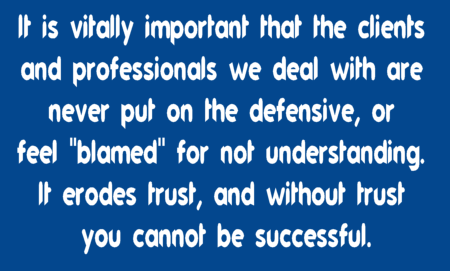Recently, I had one phone conversation and one email, with two different people who are hoping to, and working to become advocates, both exchanges which resulted in very negative takeaways on my part.
And then I wondered – how many of us leave the same impression, even if we never intend to come across the way we do? And if we do so, no matter how unintentionally, does it give patient advocacy a bad name, or a black eye?
Those twisted words are actually responses most of us run into every day. All that is required to fix them is a slight difference in response which results in a huge difference in the impression they make.
It’s the difference between:
you misunderstood me (or) you read that wrong (both of which blame the listener or reader)
— vs —
I must not have been clear (or) let me rephrase that (both of which take responsibility for the clarification)
Here’s what I mean:
The phone discussion …
… was about patient advocacy education. The caller wanted to know what courses I thought she should take. That’s not a determination I can make for her, nor could I spend an hour on the phone with her to figure it out. But I did direct her to our gap analysis article called “Choosing the Best Health or Patient Advocacy Educational Program for You” which could help her sort out the right answers for herself.
“You misunderstood me!” she replied. I’m not asking you to send me somewhere else. I’m asking you to tell me the answer.”
Ouch!
Suddenly it was my fault she didn’t have the answers. Hearing “you misunderstood me” instantly put me on the defensive, as if I had done something wrong. Very uncomfortable. I had to wonder whether she would talk to a client, or a provider, or anyone else she would deal with in the healthcare system in the same way. And if so, how does that affect the regard for our profession?
The email exchange …
… was even more uncomfortable. In fact, the email was the catalyst for the post written a few weeks ago called, Enemies? No, But With an Important Distinction.
The writer belongs to a handful of organizations for advocates, some of which are focused on private advocacy, and one of which is focused on institutional advocacy. Her statement was, “it offers institutional memberships to hospitals and has multiple affiliations with those purported enemies of true patient advocacy, patient relations departments.”
When I took umbrage to her description of hospital advocates as the “enemy” she wrote back, “You misunderstood my email: by “purported enemies” I meant the in-hospital folks. Read that sentence again.”
Whoa!
I’m sure I don’t have to tell you how I reacted to that one. Blaming the reader. Very accusatory. I felt like I had been slapped.
Again, I have to wonder – is that how she communicates with others with whom she deals? Does such accusatory language make others who haven’t dealt before with professional advocates think negatively about us?
Then there is the additional problem that, having felt blamed and put on the defensive, I instantly stepped out of the conversation (in my head) and wondered, “What did I do wrong? Did I say something offensive?” I was no longer focusing on the topic at hand. Instead I was now off in another world, in another realm of questions. Feelings were hurt. Toes felt squashed.
The rest of the conversation was then tainted, as it was difficult for me to give her the objective information she needed. In advocacy work, that can actually be dangerous.
Now – it’s entirely possible that both women with whom I had these exchanges will read this post and be appalled, because I doubt either one of them intended to come across the way they did. I also doubt they would have wanted me to react the way I did (by the way, neither of them knows how I reacted. I stayed professional and above-board with both, continuing the conversation politely and trying to provide them with the assistance they needed.)
But react I did – which is no different from any other member of the public they might talk to, or any other professional they might interface with. To me it came across just like blaming a crime on the victim.
The key here is that none of us – ever – intends to miscommunicate. But it’s going to happen. It’s a given.
There will be times we aren’t as clear as we like to be. In vocal conversation we at least have tone of voice to help in our communication. But with email or even just blogging or article writing, we can’t see or hear “tone of type” so miscommunication WILL take place. It happens all the time.
How to we fix it?
Begin by taking “you” out of the response and using “I” or “me” instead. Even if the other person didn’t hear correctly. Even if it IS their fault. Even if you said what you needed to say perfectly and something was wrong with how it was received – STOP blaming and START taking responsibility for making sure you are understood.
Replace “you misunderstood me” with “I need to clarify” or “let me explain it more clearly” or variations on those words, where YOU shoulder the burden of making yourself better understood.
To further strengthen this difference, don’t use words like “again,” as in “let me explain it again” – because that, like using “you” blames the receiver for not getting it the first time.
It is vitally important that clients and professionals we deal with are never put on the defensive, or feel “blamed” for not understanding. It erodes trust, and without trust you cannot be successful.
The simple turn of a phrase can make a huge difference in how we are perceived, and the trust levels that result.
. . . . . . . . . . . . . . . . . . . . . . . . . . . . . .
Share your experience or join the conversation!
LEARN ABOUT APHA MEMBERSHIP | MORE REASONS PATIENTS NEED ADVOCATES | MASTER LIST OF PRACTICE RESOURCES







I know I have problems on both ends of a conversation. Sometimes I don’t remember to think carefully about how my words may come across, and sometimes I take exception to responses to my words. I have unknowingly and embarrassingly come across impatient or uncaring, when my ADD mind begins to pull tidbits from the conversation to keep. I also want to be dealt with respectfully and peacefully. Communication is so key, yet there are sometimes a lot of rules to remember when it doesn’t come natural.